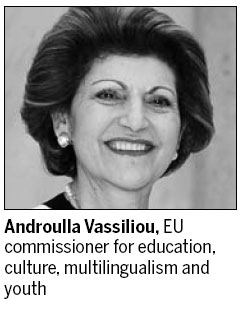EU welcomes China's cultural drive
Updated: 2012-02-02 08:03
By Fu Jing (China Daily)
|
|||||||||||
 |
BRUSSELS - The European Union welcomes China's strategy to boost its soft power by spreading its culture across the globe, said a top EU culture official.
European Commissioner Androulla Vassiliou said culture plays an important part in achieving the Beijing's aspiration of gaining more global influence and boosting its soft power.
In late 2011, China's highest leadership decided to make building up its cultural strength and global influence a national development strategy.
Vassiliou, the EU commissioner for education, culture, multilingualism and youth, said China's international role has dramatically increased in the past decade, largely due to economic factors, and it is strengthening international ties and is engaging in international dialogue.
"Now, it is starting to envisage its role in the world as more than just commercial or economic. In this context, culture plays an important part," she told China Daily in an exclusive interview.
Vassiliou made the comments ahead of the opening of the 2012 EU-China Year of Intercultural Dialogue, which was decided at the EU-China Summit in October 2010 by leaders from both sides.
Building on the 2011 EU-China Year of Youth, the Year of Intercultural Dialogue will promote cultural exchanges and all forms of people-to-people contacts and international projects that contribute to mutual understanding in different policy fields.
Before the opening ceremony, Culture Minister Cai Wu said the decision to boost cultural exchanges between China and the EU shows the courage and determination of the leaders from both sides.
"Nowadays, globalization is speeding up and both China and the EU should go beyond political and economic cooperation and contribute to humanity's future on the cultural front," said Cai, who is in Brussels to launch the EU-China Year of Intercultural Dialogue. The opening ceremony was scheduled to take place on Wednesday night (local time).
Cai said China attaches great importance to cultural exchanges with other countries to help promote global peace, stability, equality and mutual trust.
"Although China and the EU have differences and diversity in their political systems and cultures, dialogue and exchanges between different civilizations are useful to remove misunderstanding," said Cai.
China has already held culture years in France and Italy, and this year will hold one in Germany. "Awareness of Chinese culture will certainly grow as EU-China relations develop. Economic cooperation is not - and cannot be - the sole dimension of the EU-China relationship," said Vassiliou.
"That is why people-to-people contacts have been added to our strategic partnership. Cultural exchanges are at the heart of this new dimension."
When commenting on China's campaign to promote its cultural products worldwide, Vassiliou said films, books, music and other cultural products, as well as their creators and performers, play an important role in the way nations perceive themselves and each other in today's interconnected world.
"However, let me be quite clear: Cultural products cannot be exported in the same way as we export cars or financial services. Hard-sell promotion campaigns do not necessarily deliver results," said Vassiliou.
"In the cultural sector, the relationship between nations is crucial for creating interest, and therefore market opportunities."
Vassiliou said both China and the EU are parties to the 2005 UNESCO Convention on the diversity of cultural expression. This means that both sides adhere to a vision of cultural diversity that aims at rebalancing cultural flows at a global level.
Today's Top News
President Xi confident in recovery from quake
H7N9 update: 104 cases, 21 deaths
Telecom workers restore links
Coal mine blast kills 18 in Jilin
Intl scholarship puts China on the map
More bird flu patients discharged
Gold loses sheen, but still a safe bet
US 'turns blind eye to human rights'
Hot Topics
Lunar probe , China growth forecasts, Emission rules get tougher, China seen through 'colored lens', International board,
Editor's Picks

|

|

|

|

|

|





